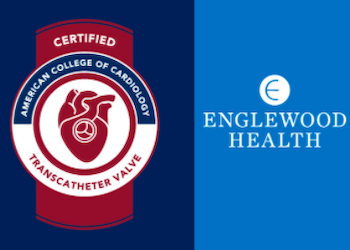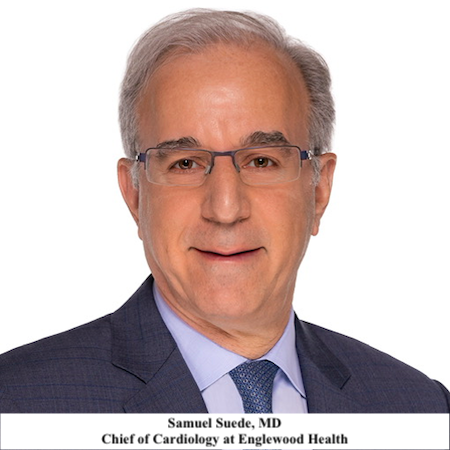 Congratulations to Englewood Health, Bergen County's first hospital to earn recognition from the American College of Cardiology for Transcatheter Valve
Congratulations to Englewood Health, Bergen County's first hospital to earn recognition from the American College of Cardiology for Transcatheter Valve
Five facts about your heart that may surprise you
It began with the ancient Greeks. Aristotle, in particular, is responsible for first associating the human heart with emotions like love, loss, and anger. Over two thousand years have passed, and we're still projecting our feelings on the mysterious, blood-pumping organ.
When it comes to matters of the heart – those pertaining to both love and health – misunderstanding and confusion are still in high supply. Though we may not be able to shed light on how hearts became the world's favorite symbol of love, we can drop some knowledge about how they work that might surprise you.
 Samuel Suede, MD, is chief of cardiology at Englewood Health and a founding partner of Cardiovascular Associates of North Jersey. Dr. Suede has spent much of his career dispelling misconceptions he hears from patients and families about their hearts – making him the perfect person to illuminate what we know for sure.
Samuel Suede, MD, is chief of cardiology at Englewood Health and a founding partner of Cardiovascular Associates of North Jersey. Dr. Suede has spent much of his career dispelling misconceptions he hears from patients and families about their hearts – making him the perfect person to illuminate what we know for sure.
Genetics alone do not determine the fate of your heart
"Your genes are not your destiny. In 2016, a study in the New England Journal of Medicine looked at nearly 56,000 people with varying degrees of risk factors for heart disease. Ultimately, the study concluded that those with the highest hereditary risk for heart disease were able to lower their risk of developing heart disease by half through healthy lifestyle choices."
Your heart needs you to do more than exercise
"Heart health is a combination of all your risk factors. You can work out every day and still have diabetes, high cholesterol, and high blood pressure – all major risk factors for heart disease. No one should take their heart for granted just because they are physically active."
Supplements may not be contributing to your heart health as much as you think
"There is no data showing supplements like Omega-3, vitamin E, vitamin C, and beta-carotene prevent heart disease. Because the supplement industry is not regulated by the FDA, they are not subject to scientifically rigorous studies, and, in recent years, several large-scale studies have come out refuting the benefits these drugs claim to have on heart health."
Symptoms of a heart attack look different for men and women
"Women tend to present with very atypical symptoms of heart attack. The classic symptoms most of us know are a crushing pain across the chest, shortness of breath, and sweating. A woman who is having a heart attack might just feel jaw pain, fatigue, nausea, or arm pain."
You can still do a lot for your heart, even if you've already been diagnosed with heart disease
"Life expectancy continues to increase and the risk of dying from heart disease continues to decrease. Because we have such effective treatments available today, heart disease is no longer a death sentence."
For more information, or to make an appointment with a specialist, call 833-234-2234 or visit englewoodhealthphysicians.org.

![Show Your Heart Some Love: A Heart-to-Heart with Englewood Health [dedicated]](/images/jcogs_img/cache/Englewood_Health_Heart_Health_-_28de80_-_b6e3bd3f092ce0628e8db23e0f3def812068f72a_lqip.png)



